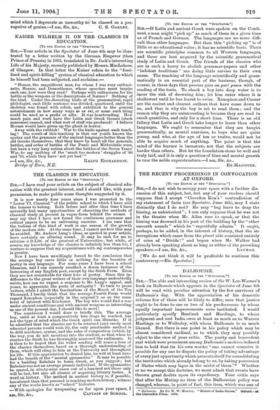SIR,—If Latin and ancient Greek were spoken on the Conti-
nent, a man might "pick up" as much of them in a given time as of French and German. The languages are no more diffi- cult than other languages. But then this "picking up" is of little or no educational value ; it has no scientific basis. There are scientific principles common to all Western Languages, and these are best acquired by the scientific grammatical study of Latin and Greek. The friends of the classics who are in such a hurry to abolish grammar-papers and other "indolent traditions" are doing little service to their own cause. The teaching of the language scientifically and gram- matically is an essential part of the business, though, of course, in these days that process goes on pan i Imam with the reading of the texts. To chuck a boy into deep water is to incur the risk of drowning him ; let him enter where it is shallowest until he has learnt to swim. Xenophon and Caesar are the easiest and clearest authors that have come down to us, and that is why the boy is set to read them ; and the reason Why they are uninteresting is because they are read in small quantities, and only for a short time. There is an old fallacy that Latin and Greek take longer to learn than other languages. We ought to remember that they are taught grammatically, as mental exercises, to boys who are quite young, and who, at the age of ten or twelve, would not be able to acquire much of anything. The point is that the mind of the learner is immature, not that the subjects are harder than others. But let the foundation-stone be well and truly laid, and it is only a question of time and mental growth to rear the noble superstructure.—I am, Sir, &c.,
Ex-MAGISTER.










































 Previous page
Previous page